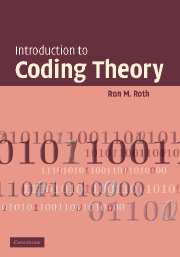Book contents
- Frontmatter
- Contents
- Preface
- 1 Introduction
- 2 Linear Codes
- 3 Introduction to Finite Fields
- 4 Bounds on the Parameters of Codes
- 5 Reed–Solomon and Related Codes
- 6 Decoding of Reed–Solomon Codes
- 7 Structure of Finite Fields
- 8 Cyclic Codes
- 9 List Decoding of Reed–Solomon Codes
- 10 Codes in the Lee Metric
- 11 MDS Codes
- 12 Concatenated Codes
- 13 Graph Codes
- 14 Trellis and Convolutional Codes
- Appendix: Basics in Modern Algebra
- Bibliography
- List of Symbols
- Index
11 - MDS Codes
Published online by Cambridge University Press: 05 June 2012
- Frontmatter
- Contents
- Preface
- 1 Introduction
- 2 Linear Codes
- 3 Introduction to Finite Fields
- 4 Bounds on the Parameters of Codes
- 5 Reed–Solomon and Related Codes
- 6 Decoding of Reed–Solomon Codes
- 7 Structure of Finite Fields
- 8 Cyclic Codes
- 9 List Decoding of Reed–Solomon Codes
- 10 Codes in the Lee Metric
- 11 MDS Codes
- 12 Concatenated Codes
- 13 Graph Codes
- 14 Trellis and Convolutional Codes
- Appendix: Basics in Modern Algebra
- Bibliography
- List of Symbols
- Index
Summary
In Section 4.1, we defined MDS codes as codes that attain the Singleton bound. This chapter further explores their properties. The main topic to be covered here is the problem of determining for a given positive integer k and a finite field F = GF(q), the largest length of any linear MDS code of dimension k over F. This problem is still one of the most notable unresolved questions in coding theory, as well as in other disciplines, such as combinatorics and projective geometry over finite fields. The problem has been settled so far only for a limited range of dimensions k. Based on the partial proved evidence, it is believed that within the range 2 ≤ k ≤ q−1 (and with two exceptions for even values of q), linear [n, k] MDS codes exist over F if and only if n ≤ q+1. One method for proving this conjecture for certain values of k is based on identifying a range of parameters for which MDS codes are necessarily extended GRS codes. To this end, we will devote a part of this chapter to reviewing some of the properties of GRS codes and their extensions.
Definition revisited
We start by recalling the Singleton bound from Section 4.1. We will prove it again here, using a certain characterization of the minimum distance of a code, as provided by the following lemma.
Information
- Type
- Chapter
- Information
- Introduction to Coding Theory , pp. 333 - 364Publisher: Cambridge University PressPrint publication year: 2006
Accessibility standard: Unknown
Why this information is here
This section outlines the accessibility features of this content - including support for screen readers, full keyboard navigation and high-contrast display options. This may not be relevant for you.Accessibility Information
- 3
- Cited by
